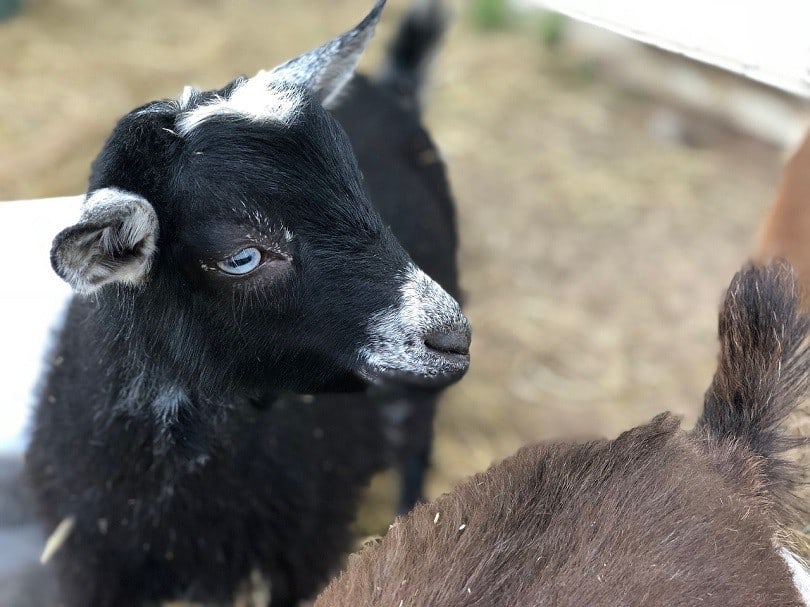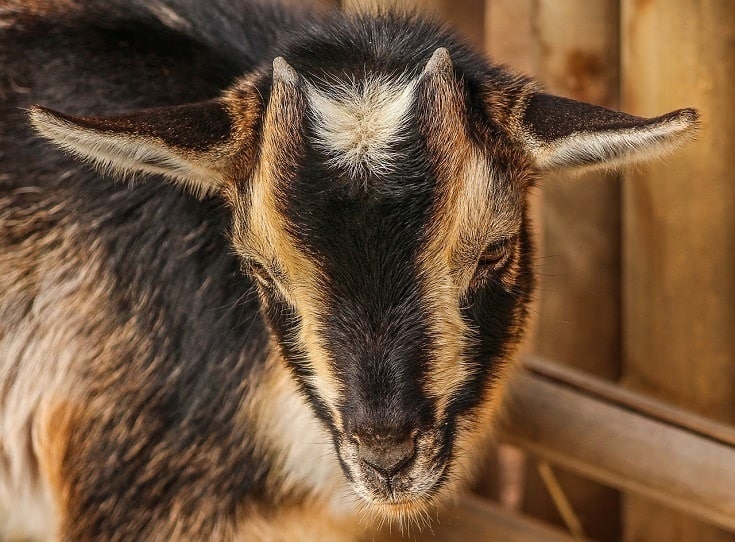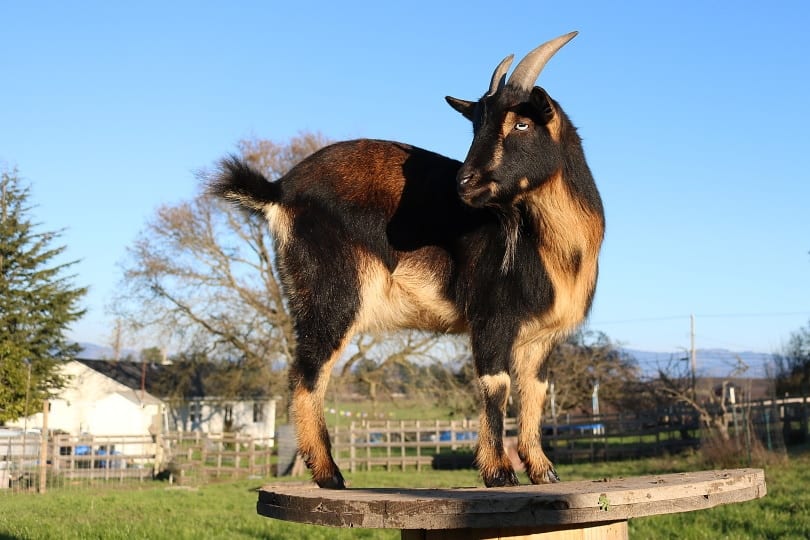The Nigerian Dwarf goat is an excellent option for those looking for an unconventional pet or a dairy goat. Due to its playfulness, this animal makes an excellent pet.
Despite their docile nature, the Nigerian Dwarf goat is incredibly hardy, capable of adapting to just about any climate. In this comprehensive guide, we shall discuss everything you need to know about this lovely goat.

Quick Facts about the Nigerian Dwarf Goat
| Species Name: | Capra aegagrus hircus |
| Family: | Bovidae |
| Care Level: | Easy |
| Temperature: | Versatile |
| Temperament: | Docile |
| Color Form: | Any color |
| Lifespan: | 7-10 years |
| Size: | Up to 80 pounds |
| Diet: | Herbivorous |
Nigerian Dwarf Goat Overview
In their native home of West Africa, Nigerian Dwarfs were highly valued for their ruggedness. They are one of the easiest goat breeds to care for in harsh conditions, as their smaller stature means that they require less feed than your typical goat.
The story behind how Nigerian Dwarfs found themselves in the United States is rather interesting. During the early to mid-1900s, there was a mass importation of African predators by American zoos. In the process, they came across the docile Nigerian Dwarf and figured that the goat would make a nice, low-maintenance source of food for the predators on the journey back home.
Against all odds, most of the goats survived. As a result, the Nigerian Dwarf found a new home in American zoos. Thanks to their small stature and friendliness, they garnered a legion of fans, especially children who could not get enough of petting them.
Within no time, people started adopting them as pets and farm animals.

How Much Do Nigerian Dwarf Goats Cost?
A registered Nigerian Dwarf for breeding purposes will set you back around $200 to $500, depending on their bloodline and availability. Those meant to be kept as pets are significantly cheaper, costing between $50 and $100.
If you are planning to purchase breeding stock, make sure that you only deal with reputable breeders. Fortunately, there are numerous goat breeder associations out there that can point you in the right direction.
Goat shows are another great way of finding a good breeder, as they showcase their best stock. However, never buy a goat at a show, as they are likely overpriced. Instead, make contacts with breeders and insist on visiting their farms before making the purchase.
Visiting a breeder’s farm is the best way of evaluating the quality of their stock. If a farm is well-managed, they are likely to have a herd of healthy goats.
When adopting any goat, consider purchasing them in pairs. This is because they are social (herd) animals, meaning that they do not do well alone.

Typical Behavior & Temperament
The Nigerian Dwarf is docile, playful, and even friendly to their human owners. In fact, they will voluntarily seek you out for some interaction. They also respond to vocal calls. If you are looking to keep one as a pet, consider bottle-feeding them when they are little.
This will make your bond much stronger. However, for other purposes, bottle-feeding them could be a bad idea, as it might make them too dependent on you.
Appearance and Varieties
As their name suggests, the Nigerian Dwarf is smaller than your average goat. Does stand between 16 and 21 inches tall, while bucks can grow to be up to 23 inches tall. The goats can weigh between 60 and 80 pounds.
Like other breeds, the Nigerian Dwarf comes in a wide variety of color combinations, with the most common ones being black, dark brown, and gold in all sorts of patterns. Again, like other goats, this breed sports short, fine hair.
Some Nigerian Dwarfs grow horns, while others do not.

How to Take Care of Nigerian Dwarf Goats
Despite their small stature, Nigerian Dwarfs are exceptionally agile, capable of jumping typical fences. Therefore, to prevent that from happening, your fence should not be any lower than 4 feet. In any case, fences are not only for keeping your goats in but also for keeping predators out.
If you decide to go the wire fencing way, keep the openings as narrow as possible so the animal cannot squeeze through.
You will also have to provide them with some form of shelter against harsh weather. Don’t forget to provide enough space for exercise. In addition, your goat will appreciate toys such as tree stumps, large rocks, and cable spools for climbing and jumping.
But be sure not to keep these toys close to the fence, as your animal might use them as a platform for jumping over the fence.

Do Nigerian Dwarf Goats Get Along With Other Pets?
These goats do get along with other pets, thanks to their friendly nature as well as smaller size. However, if you have a larger dog, make sure that it is well-socialized so that it does not view your goat as prey.

What to Feed Your Nigerian Dwarf
These goats are happy to browse on herbs, leaves, shrubs, and weeds. Therefore, allow them the freedom of pasture, as they can fend for themselves. Foraging also encourages them to exercise, which further enhances their health.
If pasture is not in abundance, hay makes for a great substitute. Consider purchasing high-quality alfalfa hay. This hay is rich in calcium, which is essential for both milk production and optimal growth and development.
Nonetheless, since alfalfa hay can be pricey, some people opt for other types of hay while supplementing with alfalfa pellets.
Speaking of supplementation, you might have to provide your Nigerian Dwarf with mineral supplements since they might not be getting all the essential nutrients from their feed.
But you must avoid supplements designed for sheep and go for those meant for goats and cattle instead. This is because sheep supplements lack copper, which is essential to goats.
Your Nigerian Dwarf will also appreciate fruits and vegetables. Additionally, make sure that they always have access to fresh, clean water.
Keeping Your Nigerian Dwarf Healthy
As with any other goat, the Nigerian Dwarf requires periodic deworming and hoof trimming. Experts recommend trimming their hooves every 6 weeks while deworming them several times a year. Additionally, make sure that they receive vaccinations annually.
It is also a good idea to have access to a vet who is familiar with goats so they can check on your Nigerian Dwarf periodically.
Breeding
Nigerian Dwarfs are prolific breeders, giving birth to as many as 5 kids per kidding. While a Nigerian Dwarf doe can come into heat when they are 4 months old, you are advised against breeding them until they are at least 8 months.
Some of the signs a doe displays when they are in heat include:
- Flagging their tails
- A swollen rear end
- Signs of discharge or mucus
- Pronounced bleating or even yelling
- Seeking out bucks
If you do not want your Nigerian Dwarfs breeding all year round, you will have to figure out a way to keep the buck away from the does. In fact, they should not even share a fence, as they have been known to mate through fences.
Are Nigerian Dwarf Goats Suitable for You?
This breed is an excellent option for people looking for either a pet goat or a prolific milk producer. They are also a good option if you want to get into the goat breeding business due to how easily they breed.

Conclusion
If you have never kept a goat before, there is no better starter breed than the Nigerian Dwarf. They are small, friendly, and highly adaptable. However, you must be ready to take in more than one, as they need to be in the presence of their own kind to be happy.
Featured Image Credit: Hollysdogs, Shutterstock
